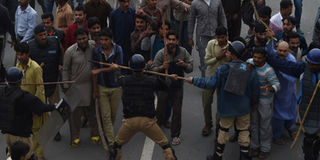Bomb in toy kills father, two children

Pakistani police and demonstrators clash during a protest in Lahore on March 16, 2015. Thousands of Christians rioted in the Pakistani city of Lahore, smashing property and vehicles as they clashed with police in a second day of protest against twin Taliban suicide bombings of churches that killed 17 people. AFP PHOTO
What you need to know:
Meanwhile, Pakistan on Tuesday hanged 10 convicted murderers from prisons across the country, the highest number in a single day after the government lifted a six-year-old moratorium on capital punishment, officials said
A father and two of his children were killed in northwest Pakistan Tuesday after a bomb concealed inside a toy went off inside their home.
The incident happened in the village of Bishigram in the Swat Valley.
Salim Khan Marwat, the area's police chief, said the 35-year-old man's three children and their cousin had found the toy in the streets and brought it home to play with.
Once home, the toy exploded. "The father, his nine-year-old daughter and seven-year-old son died on the spot while two other children were wounded," Marwat said, adding those injured were the man's other son and his nephew.
Afzal Khan, a police official in Bishigram village, confirmed the incident.
The origin of the bomb was unclear.
Dozens of children, mostly in insurgency-hit northwest Pakistan, have lost their lives in the past when playing with "toys" that turned out to be bombs.
"Toy" bombs were airdropped in neighbouring Afghanistan by Soviet forces during the 1980s as weapons against those who opposed their invasion.
The Swat Valley was under the de facto control of Pakistani Taliban commander Maulana Fazlullah from 2007 to 2009, where it imposed a harsh brand of Sharia law and carried out public floggings and hangings.
The militants were driven out by an army operation after a ceasefire broke down but remain a threat in the region.
Taliban insurgents shot girls' education campaigner Malala Yousafzai in the head in the valley in 2012.
Fazlullah, who says he ordered the shooting, was appointed chief of the Pakistani Taliban in 2013.
Pakistan has been battling a homegrown Islamist insurgency for more than a decade after it agreed to cooperate with US-led NATO forces in their war in neighbouring Afghanistan.
Meanwhile, Pakistan on Tuesday hanged 10 convicted murderers from prisons across the country, the highest number in a single day after the government lifted a six-year-old moratorium on capital punishment, officials said.
Eight of the convicts were hanged in the populous Punjab province, while two others were hanged in the southern metropolis of Karachi, according to prison officials who spoke on condition of anonymity.
The latest hangings bring to 37 the number of convicts hanged since Pakistan resumed executions in December after Taliban militants gunned down 154 people, most of them children, at a school in the restive northwest.
The partial lifting of the moratorium, which began in 2008, only applied to those convicted of terrorism offences, but was last week extended to all capital offences.
Only one person was executed during the period of the moratorium -- a soldier convicted by a court martial and sent to the gallows in 2012.
In Punjab, three murder convicts were executed from the central town of Jhang, two from Rawalpindi near the capital, one from Multan, one from Faisalabad, and one from Gujranwala.
Two other planned executions for Tuesday have been stayed by courts due to compromises with the victims' families.

Pakistani relatives and volunteers transport the body of convicted murder Muhammad Afzal after his execution in Karachi on March 17, 2015. Pakistan on March 17 hanged 10 convicted murderers from prisons across the country, the highest number in a single day after the government lifted a six-year-old moratorium on capital punishment, officials said. AFP PHOTO
Human rights group Amnesty International estimates that Pakistan has more than 8,000 prisoners on death row, most of whom have exhausted the appeals process.
Supporters of the death penalty in Pakistan argue that it is the only effective way to deal with the scourge of militancy.
But rights campaigners have been highly critical, citing problematic convictions in Pakistan's criminal justice system which they say is replete with rampant police torture and unfair trials.
Pakistan's courts are notoriously slow, heavily reliant on witness testimony over crime scene evidence, and provide little by the way of protection for judges or witnesses who are often intimidated or bribed into dropping their claims.
"This shameful retreat to the gallows is no way to resolve Pakistan’s pressing security and law and order problems," Rupert Abbott, Amnesty International's deputy Asia-Pacific director, said last week.
European Union diplomats have also raised the issue of capital punishment -- and the case of one man who was condemned to death as a teenager in particular -- in meetings with Pakistani officials focused on trade and human rights.
The EU granted Pakistan the much coveted "GSP+" status in 2014, giving the country access to highly favourable trade tariffs, conditional on Pakistan enacting certain commitments on human rights.




